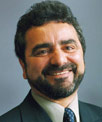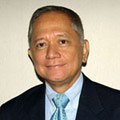Language Policy in the Tertiary Context
Featured Colloquia > Language Policy in the Tertiary Context
Prof Joseph Lo Bianco
University of Melbourne
Australia
Joseph Lo Bianco, AM, holds the Chair of Language and Literacy Education at The University of Melbourne, and is Associate Dean International in the Faculty of Education as well as being Honorary Professor in Education at the University of Hong Kong. He was formerly Director of the National Languages and Literacy Institute of Australia. He has worked on language policy, literacy planning, bilingualism and multicultural education in many countries including Australia, Sri Lanka, Vietnam, Western Samoa and Scotland. His recent books include: Australian Literacies: Informing National Policy on Literacy Education, with P. Freebody, 2001; Australian Policy Activism in Language and Literacy, with R. Wickert, 2001; Voices from Phnom Penh, Development and Language, 2002; Teaching Invisible Culture: Classroom Practice and Theory, with C. Crozet 2003; and Language Policy in Australia, Council of Europe, 2004. He has more than 120 refereed publications. For his research and policy work in language and literacy Professor Lo Bianco has been elected Fellow of the Australian Academy of the Humanities and Fellow of the Australian Council of Educators, and has been awarded the Order of Australia, the Centenary Medal and the title of Commendatore nell’ordine di merito della repubblica Italiana. In 2007 he was awarded the College Medal of the Australian College of Educators.

Prof Saran Kaur Gill
Universiti Kebangsaan MalaysiaMalaysia
Saran Kaur Gill has researched, published and presented plenary papers in the area of Language Policy and Planning in Higher Education in Malaysia. One of her key publications is a book titled, "International Communication: English Language Challenges for Malaysia" (Universiti Putra Malaysia Press). She successfully led a two-year ('03-'05) research project on "Language Policy and Planning in Higher Education: Responding to the Needs of the Knowledge Economy" funded by the Malaysian government. She is a member of the editorial review boards of TESOL Quarterly, the International Multilingual Research Journal and Asian Englishes – An International Journal of the Sociolinguistics of English in Asia/Pacific. In October, 2004, she was appointed member of the UNESCO Scientific Committee for the Asia-Pacific Region on Higher Education, Research and Knowledge. This was an appointment, which had to be competed for on the international platform on the basis of the quality of scholarship and leadership capabilities. She spent the spring of 2006 on a Fulbright Scholars Award researching on "Language Policy – Managing Ethnic, National and Global Identities" at the University of Pennsylvania, Philadelphia. This led to invitations to guest lecture at Columbia University, New York, University of Texas, San Antonio and University of Arizona, Phoenix. In September 2007, she was appointed Deputy Vice-Chancellor (Industry and Community Partnerships) of Universiti Kebangsaan Malaysia.

Prof Alan Davies
The University of EdinburghUK
Alan Davies is Emeritus Professor of Applied Linguistics at the University of Edinburgh. After a degree in English at the University of Oxford and seven years as an English teacher in the UK and Kenya, he developed the English Proficiency Test Battery for the British Council at the University of Birmingham. He has taught at universities in Nepal and Hong Kong and was for five years Director of the Language Testing Research Centre at the University of Melbourne. He has served as editor of the journals Applied Linguistics and Language Testing. His publications include the Dictionary of Language Testing (co-author, Cambridge University Press 1999), The Native Speaker: Myth and Reality (Multilingual Matters, 2003), The Handbook of Applied Linguistics (co-editor, Blackwell, 2004), A Glossary of Applied Linguistics (Edinburgh University Press, 2005) and An Introduction to Applied Linguistics (Edinburgh University Press, 2nd edition 2007). His book on the history of academic English language testing in the UK will be published by CUP in early 2008. He was recently awarded a Leverhulme Emeritus Fellowship for a study entitled ‘Native Speakers and Native Users’.

Dr Edilberto C de Jesus
Former Secretariat DirectorSoutheast Asia Ministers of Education Organization (SEAMEO)
Edilberto C de Jesus stepped down as Secretariat Director of the Southeast Asian Ministers of Education Organisation (SEAMEO) in January 2008. He had been responsible for coordinating activities among SEAMEO member countries, SEAMEO Centres, donors and other organisations, to convene meetings and conferences, focus on policy matters and organise special projects. Dr Edilberto C de Jesus attended Ateneo de Manila University where he achieved a BA honours course in Humanities before completing M. Phil and Ph. D. degrees in History at Yale University. After his studies he joined the faculty of the Asian Institute of Management. He served in the Cabinet of President Corazon Aquino from 1987 to1992 as Presidential Adviser on Rural Development and Deputy Peace Commissioner. He returned to AIM to put up the Policy Center, leaving In 1995 to serve as the president of Far Eastern University in Manila. From 2002-2004, he served as Secretary or Minister of Education in the first term of President Gloria Macapagal Arroyo.
Abstracts
Language Policy in the Tertiary Context: Challenges and Creative Responses
This colloquium draws together a wide range of perspectives on the issues of the broader language policy consequences of adopting English as medium of instruction in higher education, while also paying attention to the reality of the use of English as medium of education in schools. The main strands of reflection that will be built into the colloquium are geographic (European and Asian, SE and N Asian, East and West European), institutional (Ministers of Education, Regional Organizations, Parliaments, Universities and Schools), and also interpretive perspectives (those of scholarly research and those of policy implementation and politics). This rich array of angles from which to view English and its connections with and consequences for other languages in multi-lingual, multi-script and multi-cultural societies today aims to expose technical, efficiency, identity, ideological and developmental rationales for the adoption and use of English to scrutiny and to stimulate discussion of language policy. We are aware that while there are regional and continental differences that condition local practice, there are also shared global features from which we can all profit by learning about and discussing.
English, Asia and Education Perspectives from the Philippines and SE Asia
by Dr Edilberto C. de Jesus
The multiplicity of languages spoken in Southeast Asia has historically presented a problem for the governments of the region. For the colonial powers, the central concern was language as a tool for administration and control and they approached the problem in different ways. The fact that they brought their own language into the region further complicated the linguistic situation. Managing linguistic differences became a more difficult issue for the post-colonial governments, which had to worry about strengthening the cohesion among different ethnic and religious communities. The new dimension of this problem is the emergence of English as the dominant language of commerce and technology in the world and the region’s de facto lingua franca. The need to promote a national language as a unifying element for the country remains. But governments must also help their people learn English to enable them to compete in an increasingly globalized market. The concern for bilingual competence thus places a double burden on the school system. In many countries, however, governments cannot deal with the language problem effectively until they address the more fundamental education problem.
English and Education: Perspectives from Applied Linguistics: Academic Language Testing in the UK
by Prof Alan Davies
The paper argues that developments in academic language testing in the UK since 1950 have been strongly influenced by Applied Linguistics. This influence has publicly validated academic language tests to the extent that they have acted as a de-facto language policy. Two questions are addressed in this paper: what makes a good test and what is academic language proficiency? For the first, it is concluded that for prediction alone, grammar is good; for face validity in academia (especially with subject specialists), an ESP approach is good. For general appeal, we would favor IELTS because a language proficiency test needs more than prediction. Prediction, we might say, is only one part of what an academic language proficiency test is for. It also needs such qualities as communicative ability, efficient delivery, being well-maintained and research-led, having monitored impact so that it can be welcomed with the seriousness it deserves by admissions officers, government officials, employers, and by the candidates themselves. For the second question, academic language proficiency is the language of argument, of analysis and of explanation and reporting, in all cases not being specific to any particular academic area. It is skilled literacy and the ability to move easily across skills. In other words, it is the literacy of the educated and it accepts the construct of there being a general language factor which is the case for all those entering higher education, whatever specialist subject(s) they will study. The norms and control provided by academic language tests are social facts which effectively take the place of an official language policy.
Teaching Science in English in Higher Education in Malaysia: Sufficient Supportive Structures and Systems?
by Prof Saran Kaur Gill
Public universities in Malaysia have experienced a major change in language of instruction from Bahasa Malaysia to English for science and technology. This has resulted in a major challenge for academics, particularly those who have been educated in the Malay medium and have been teaching in Bahasa Malaysia all these years. It is these academics who need support not only linguistically but also pedagogically to cope with the new change in medium of instruction. This paper aims to examine the implementation realities of teaching science in English, with a focus on the nature of the preparatory pedagogical training. In addition, these academics face another challenge. This arises as a result of the new status of universities as research universities which places tremendous pressure on academics to actively participate in research projects and ensure the relevant outcomes. The demands of research have to be dealt with simultaneously with their teaching responsibilities. As a result, many academics find themselves being pulled in these two varying directions. Therefore, this paper will examine the institutional structures and systems in place that assist academics to face the challenges of both teaching and research and ensure greater harmony in these dual activities.
Language Policy and Higher Education: Perspectives from Australia, the US and Europe
by Prof Joseph Lo Bianco
Few higher education institutions declare a formal language policy and even fewer engage in any of the processes of formulation of language policy which are conventionally associated with the practice and 'science' of language planning. Yet, of all institutions higher education is one in which the very practice of the core business implies and daily instantiates and enacts language decisions. This paper will look at some attempts to formalize language policies in higher education institutions, taking examples from Australia, the UK and the USA, policies that are wide-ranging and policies that are more narrowly targeted, and discuss what is gained and lost in the formalization of the activity.
